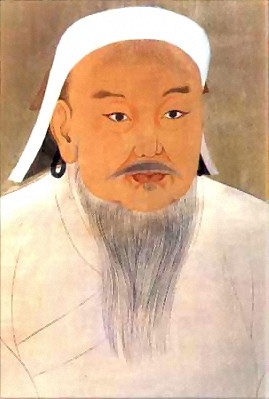
The Mongol ruler who built up the vast Mongol empire in the early 1200s, Genghis Khan and his armies terrorised people with their violence and cruelty, but to his people he was God’s representative on Earth, their supreme ruler.
He formed armies of horsemen, and after many victories whole armies came to join him. His fierce Mongol soldiers conquered most of northern China by breaking through the Great Wall. His empire stretched right across Asia and into Eastern Europe and Russia.
Genghis Khan was a warrior and ruler of genius who, starting from obscure and insignificant beginnings, brought all the nomadic tribes of Mongolia under the rule of himself and his family in a rigidly disciplined military state. He then turned his attention toward the settled peoples beyond the borders of his nomadic realm and began the series of campaigns of plunder and conquest that eventually carried the Mongol armies as far as the Adriatic Sea in one direction and the Pacific coast of China in the other, leading to the establishment of the great Mongol Empire.
The great conquests of the Mongols, which would transform them into a world power, were still to come. China was the main goal. Genghis Khan first secured his western flank by a tough campaign against the Tangut kingdom of Xixia, a northwestern border state of China, and then fell upon the Jin empire of northern China in 1211. In 1214 he allowed himself to be bought off, temporarily, with a huge amount of booty, but in 1215 operations were resumed, and Beijing was taken. Subsequently, the more systematic subjugation of northern China was in the hands of his general Muqali. Genghis Khan himself was compelled to turn aside from China and carry out the conquest of Khw?rezm. This war was provoked by the governor of the city of Otrar, who massacred a caravan of Muslim merchants who were under Genghis Khan’s protection. The Khw?rezm-Sh?h refused satisfaction. War with Khw?rezm would doubtless have come sooner or later, but now it could not be deferred. It was in this war that the Mongols earned their reputation for savagery and terror. City after city was stormed, the inhabitants massacred or forced to serve as advance troops for the Mongols against their own people. Fields and gardens were laid waste and irrigation works destroyed as Genghis Khan pursued his implacable vengeance against the royal house of Khw?rezm. He finally withdrew in 1223 and did not lead his armies into war again until the final campaign against Xixia in 1226–27. He died on August 18, 1227.
Credit : Britannica
Picture Credit : Google




